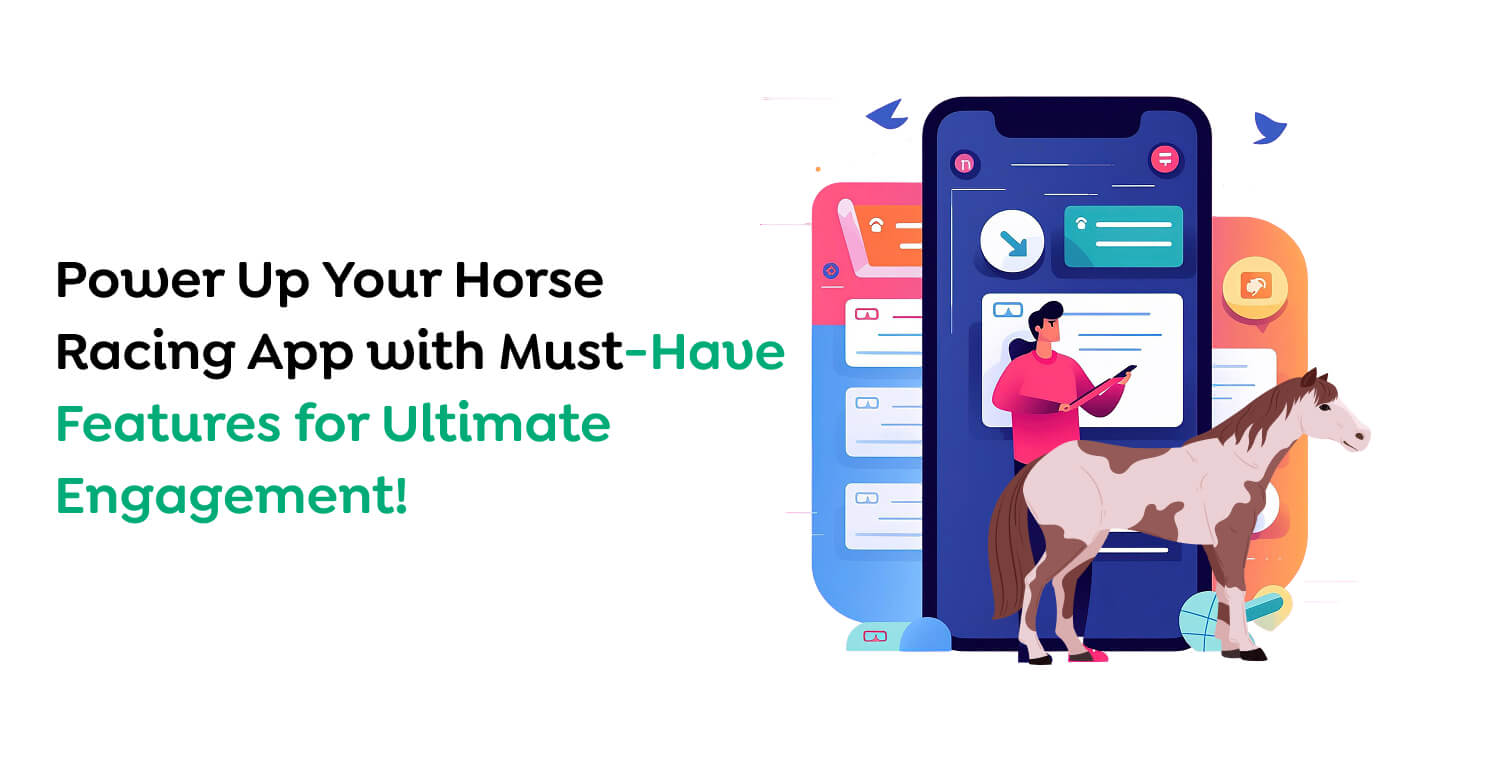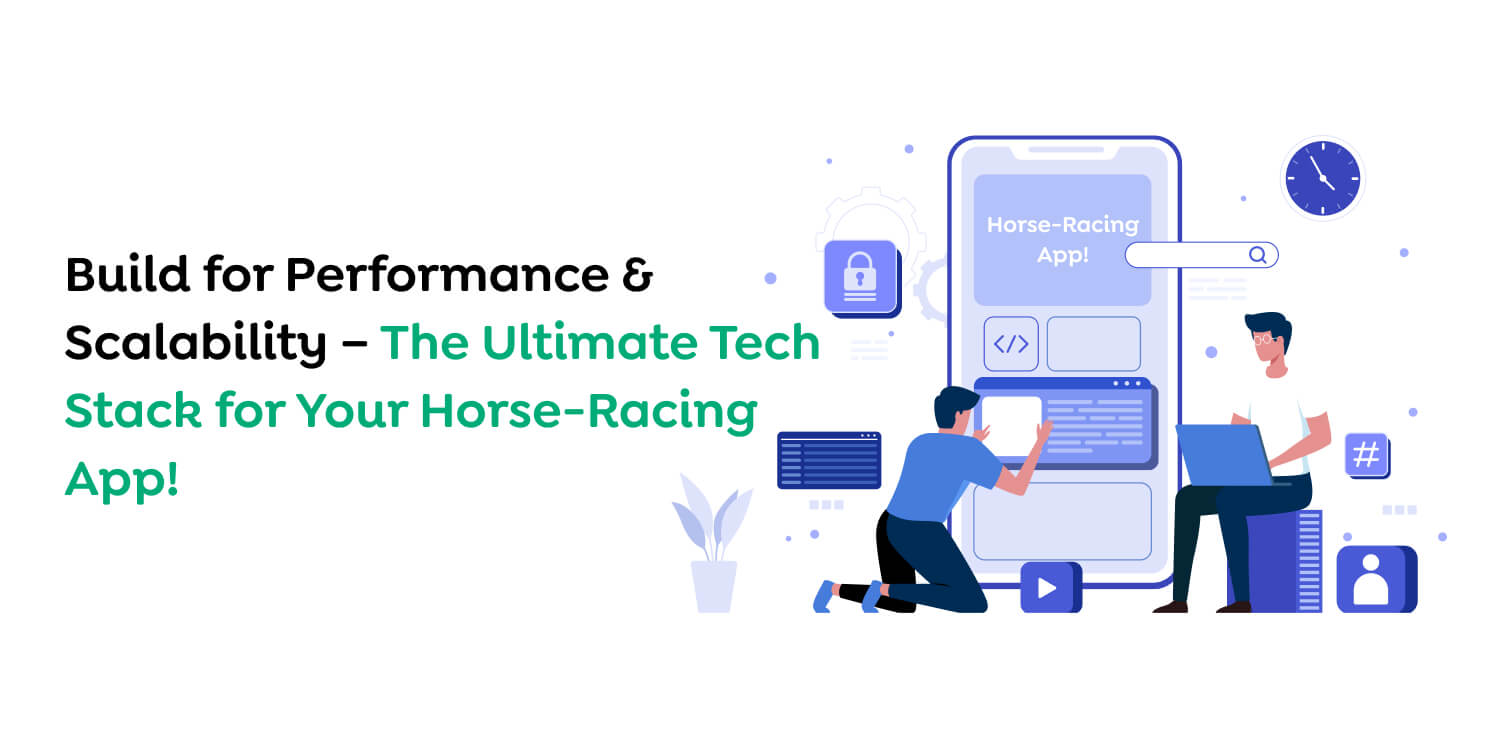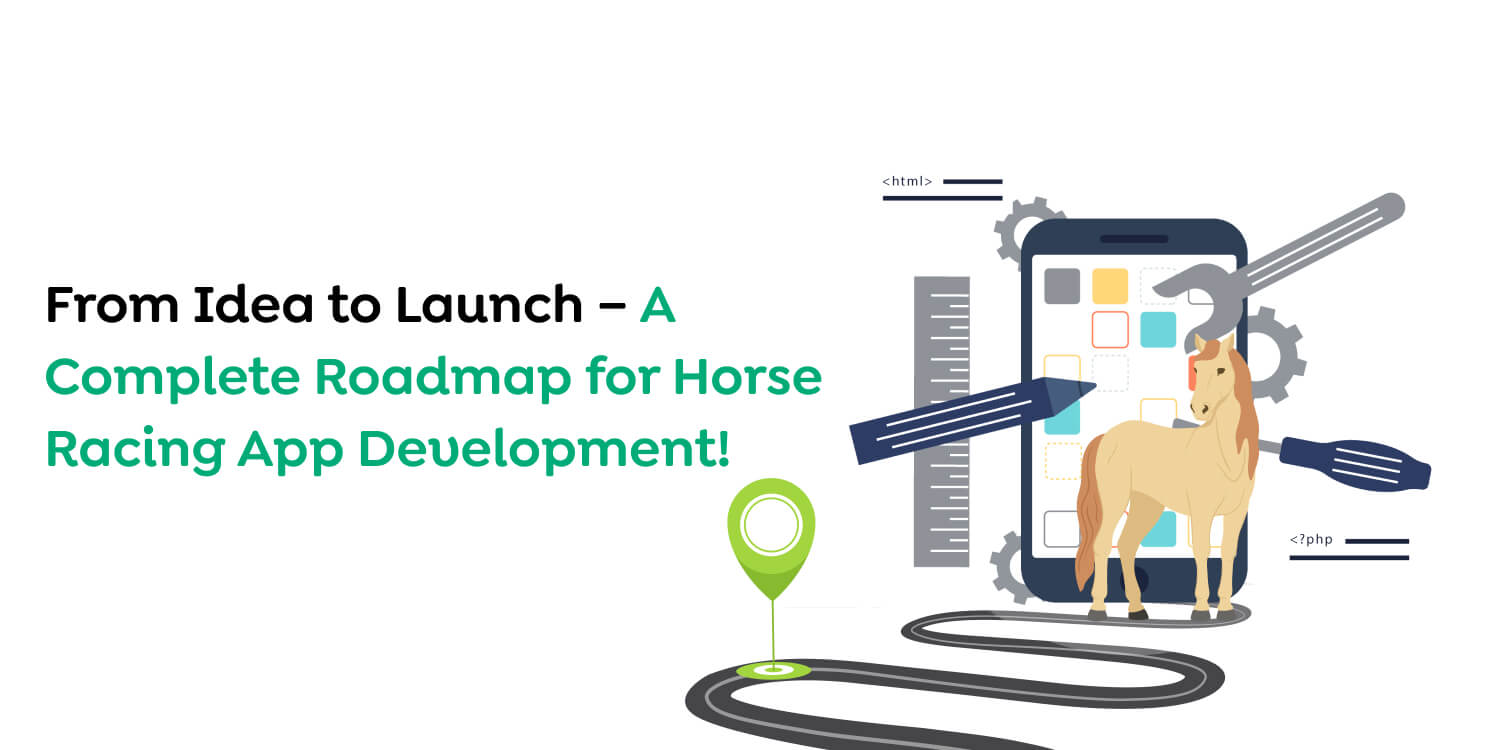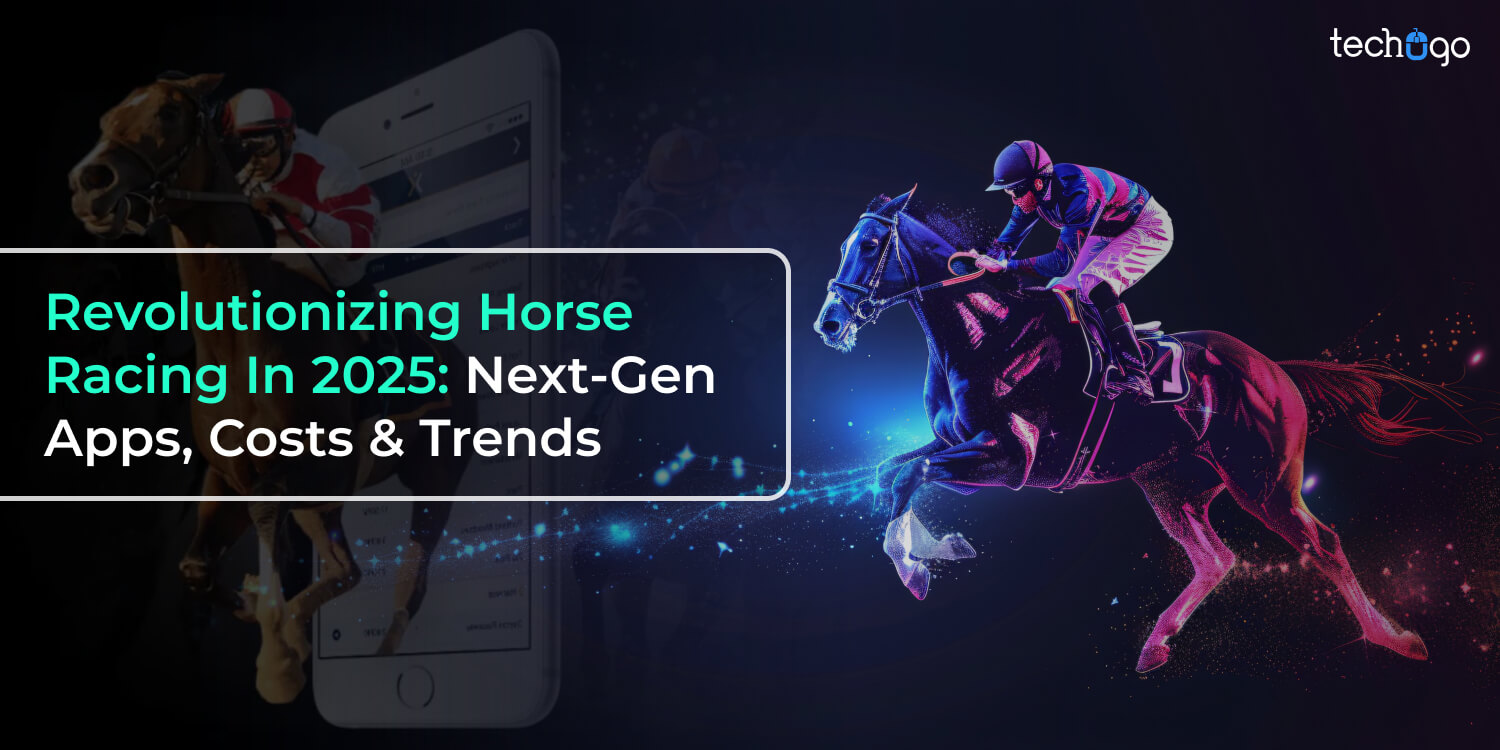The sport of horse racing has driven continuous excitement and prestige, and it involves global audiences that focus on betting and equestrian events. Modern mobile technology has transformed horse racing through lineup features that let people access real-time betting, live streaming, and race schedules, combined with expert advice and extensive statistical analytics. The combination of race results, jockey and horse statistics, and interactive community functions in these apps produces essential utility for all horse fans, including regular fans and betting professionals.
Developing horse racing apps for 2025 demands complete knowledge regarding market trends, user preferences, and advanced technological capabilities. Contemporary horse racing apps integrate various innovative features into their platforms through AI predictive analysis and blockchain transaction security protocols to deliver a seamless user experience. The development team must prioritize regulatory adherence, payment gateway support, and friendly user interfaces to provide service to users across various global markets.
This blog examines critical components for building racing apps, which cover obligatory functions, project development sequences, budget calculations, modern technical solutions, income generation approaches, and emerging industry forecasts. This extensive guide equips entrepreneurs wishing to enter the market and current stakeholders who want to advance their platforms through vital insights toward building successful horse racing apps.
If you’re looking for a reliable mobile app development company in Saudi Arabia, it’s crucial to partner with experts who understand the regional market dynamics.
Why Invest in a Horse-Racing App in 2025?

The global online gambling market will expand to $127.3 billion in 2027, and horse racing will be a major force behind this market development. Mobile betting is gaining popularity while artificial intelligence predicts races better, blockchain secures transactions, and live-streaming functions improve user experience. The year 2025 delivers a highly profitable venture for businesses that want to exploit the digital betting platform market expansion through horse racing app investments. Horse racing apps become essential betting tools for worldwide gamblers because cutting-edge technology enables secure transactions while improving the user experience. With real-time analytics and GPS tracking, horse racing tracking app development is transforming how races are monitored and analyzed.
Benefits of a Horse Racing App
1. Real-Time Betting
Mobile horse racing applications provide immediate betting options at any location, so users do not need to visit actual bookmaking premises. The built-in payment gateways and this accessible feature drive increased user participation, which is combined with enhanced engagement to ensure smooth transactions.
2. Live Streaming
The combined viewing experience of live horse races served through online broadcasts delivers a superior wagering experience since users can now watch races unfold without delay. Real-time commentary and high-quality streaming through multiple camera angles create an exciting betting environment for users.
3. AI-Powered Predictions
Through artificial intelligence technology, users obtain valuable betting information when the system evaluates historical patterns in addition to those of horses and jockeys and tracks their environments and market shifts. By generating forecast predictions through analytics, the system delivers valuable information to users who enhance both their success rate at winning and the number of amateur and professional bettors.
4. Enhanced User Engagement
User engagement remains high because gamification mechanisms work through leaderboards, reward systems, and loyalty schemes. Virtual reality features enable users to create interactive virtual racetrack environments that let them virtually meet other bettors during their betting experience.
5. Monetization Opportunities
Users who download a horse racing application can access various revenue paths because it enables purchasing items within the app, provides premium membership access with private insights, and offers advertising options from bookmakers to equestrian companies and wagering agencies. Security features powered by blockchain smart contracts enable high-value users to engage and seek transparent transactions with reliability in this platform.
With the right combination of innovative features, user-friendly interfaces, and compliance with gambling regulations, a horse racing app in 2025 can revolutionize the betting industry and generate substantial revenue for stakeholders.
Dubai is a hub for cutting-edge digital solutions, so choosing a mobile app development company that aligns with your business goals is essential.
Essential Features of a Horse Racing App

Developing an effective horse racing mobile application depends on fundamental and complex features that guarantee uninterrupted security and user engagement. Wells-designed application benefits user retention while offering innovative features that simultaneously attract casual fans and professional bettors, leading to increased revenue. The following details every essential function that must be incorporated into modern horse racing apps during 2025:
1. User Registration & Authentication
Signing up and starting use must be safe and problem-free to gain and keep users.
- Social Media Login: Users can efficiently create accounts by utilizing their social media accounts from Google, Facebook, or Apple.
- Multi-Factor Authentication (MFA): The system requires security enhancements through OTPs, biometric authentication, and email verification.
- KYC (Know Your Customer) Verification: User identity checks along with age verification form the basis for enabling betting features according to betting regulations
2. Live Race Streaming
Real-time, high-quality race streaming improves user engagement and betting accuracy.
- High-Definition (HD) Streaming – Deliver seamless and uninterrupted race coverage.
- Live Commentary & Real-Time Updates – Expert insights and analysis keep users informed.
- Multiple Camera Angles – Provide an immersive experience with dynamic race views.
- Race Replay & Highlights – Allow users to watch missed races and key race moments.
3. Betting Module
A betting system that integrates well into the whole operation allows users to get maximum revenue alongside satisfaction.
- Fixed-Odds & Pool Betting: The betting system should present various betting alternatives to accommodate different customer tastes.
- Multiple Payment Gateways: The booking platform should allow users to make hassle-free payments using credit/debit cards, digital wallets, and cryptocurrencies.
- AI-Driven Odds Calculation: Artificial intelligence systems should use betting trends, horse performance data, and race circumstances to adjust odds in real-time.
- Live Betting Updates: The system displays current odds adjustments, shows historical bets, and allows users to make cash-outs during matches.
4. Horse & Jockey Profiles
Detailed insights into horses and jockeys help users make informed betting decisions.
- Performance Statistics – Display speed records, win/loss ratios, and past performance history.
- Past Race Results – Provide historical race outcomes, track conditions, and comparisons.
- Injury & Training Updates – Update users with fitness reports and training schedules.
- Horse Pedigree & Bloodline Data – Offer insights into lineage, breeding history, and genetic strengths.
5. AI-Powered Predictive Analysis
AI integration enhances the accuracy of race predictions and odds calculations.
- AI-Driven Race Predictions – Provide users with intelligent betting recommendations.
- Machine Learning Algorithms – Analyze past races, weather conditions, and track types to suggest optimal bets.
- Real-Time Betting Insights – Track betting trends and offer personalized suggestions.
- Risk Management Tools – Help users assess potential losses and make data-driven decisions.
6. Push Notifications & Alerts
Timely updates improve user engagement and betting participation.
- Race Reminders – Notify users about upcoming races and scheduled bets.
- Betting Tips & Odds Changes – Provide expert analysis and last-minute betting insights.
- Promotional Offers & Bonuses – Alert users about special deals, loyalty rewards, and betting discounts.
7. In-App Wallet & Payment Integration
A seamless payment system ensures secure and fast transactions.
- Secure Deposits & Withdrawals – Enable instant transactions with robust encryption.
- Cryptocurrency Support – Allow betting with Bitcoin, Ethereum, and other digital currencies.
- Multiple Payment Options – Support credit/debit cards, PayPal, Google Pay, Apple Pay, and prepaid cards.
- Instant Payouts & Cash-Out Feature – Let users withdraw winnings in real-time.
8. Social Features & Community Engagement
Encouraging social interaction enhances the user experience and fosters community participation.
- Live Chat & Forums – Facilitate discussions, race predictions, and expert opinions.
- Sharing Race Highlights – Users can post race clips and personal betting successes.
- Leaderboards & Competitions – Boost engagement with ranking systems and reward programs.
- Fantasy Horse Racing – Enable users to build and manage virtual horse teams for competitions.
9. Augmented Reality (AR) & Virtual Reality (VR) Integration
Immersive technologies provide a next-level horse racing experience.
- Virtual Horse Race Simulations – Let users experience simulated races with realistic visuals.
- Interactive Betting Experience – Use Augmented Reality to provide overlays of horse statistics and race predictions during live events.
- VR-Based Race Viewing – Offer users a 360-degree race-viewing experience from different track positions.
10. Regulatory Compliance & Responsible Gambling
Ensuring compliance with gambling laws and promoting responsible betting builds credibility.
- Age Verification – Implement strict age-check mechanisms before allowing access to betting features.
- Self-Exclusion Features – Allow users to set self-imposed betting limits to prevent gambling addiction.
- Responsible Betting Limits – Enable users to set deposit, betting, and time limits for safer gambling practices.
- GDPR & Data Protection Compliance – Ensure user data privacy with end-to-end encryption.
Additional Advanced Features to Enhance User Experience
- Multi-Language Support – Cater to global users with multiple language options.
- AI Chatbots for Customer Support – Provide 24/7 assistance for betting queries and troubleshooting.
- Voice Command Betting – Integrate voice recognition for hands-free betting experiences.
- Geo-Fencing & Location-Based Promotions – Offer exclusive bonuses and betting options based on user location.
- Affiliate & Referral Programs – Reward users for inviting friends to join the platform.
By incorporating these essential and advanced features, a horse racing app in 2025 can provide a competitive edge, attract a loyal user base, and maximize revenue streams. As technology evolves, continuous updates and innovations will be necessary to stay ahead in the dynamic online betting industry.
Tech Stack for Horse Racing App Development

A leading mobile app development company in the UAE ensures that your app is built with the latest technology and meets the highest quality standards. So, let’s discuss the ultimate tech stack for your horse racing app-
Organizations must select the correct combination of technology elements since it directly determines performance outcomes, scalability levels, security measures, and consistent user experience. Developing a stable, efficient horse racing app requires the correct fusion of front-end, back-end database, and cloud technologies. The following detailed tech stack recommendation is suitable for 2025.
1. Front-End Development
- User interface (UI) with user experience (UX) functions belong to the front-end section. The framework selection is vital in achieving fluid app communication and response times.
Cross-Platform Development (For iOS & Android)
The ability to write code once from both platforms using a cross-platform framework minimizes development expense and speeds up development time.
- React Native: Offers a native-like experience, excellent performance, and a strong developer community.
- Flutter: The Dart-powered interface supports flexible user interfaces that accelerate rendering speed for visually demanding programs.
Native App Development (For Platform-Specific Optimization)
If you prefer a native approach for maximum performance, choose:
- Swift (for iOS) – Apple’s robust programming language optimized for speed and security.
- Kotlin (for Android) – Google’s official language for Android development, known for its conciseness and reliability.
Additional Front-End Tools
- Redux / MobX – This is for state management in React Native apps.
- GraphQL / RESTful APIs – This is for efficient data fetching and updating.
- Lottie / Rive – For smooth animations and engaging UI/UX.
2. Back-End Development
The back end is your app’s core. It handles data processing, transactions, security, and real-time updates.
Recommended Back-End Technologies
- Node.js – Ideal for real-time betting apps due to its event-driven architecture.
- Django (Python) – Secure and scalable, suitable for AI-driven predictions and machine learning.
- Ruby on Rails – Fast development and easy maintainability, great for building robust betting systems.
Microservices Architecture
For scalability and performance, adopting a microservices-based back-end allows independent deployment and maintenance of features.
- Spring Boot (Java) – Best for scalable and distributed systems.
- Express.js (Node.js) – Lightweight and flexible for microservices-based applications.
- Kafka / RabbitMQ – Real-time event streaming is crucial in live betting applications.
Additional Back-End Tools
- Redis – For caching frequently accessed data, reducing server load.
- Firebase Cloud Messaging (FCM)- Is for push notifications and alerts.
- OAuth 2.0 / JWT (JSON Web Token) – For secure authentication.
3. Database Management
Choosing the correct database is essential for efficiently handling large amounts of betting data, user transactions, and horse racing statistics.
Relational Databases (SQL-Based) – Ideal for structured data storage
- PostgreSQL – Scalable, high-performance, and suitable for complex queries.
- MySQL – Well-optimized for transactions and financial applications.
NoSQL Databases (For Scalability & Speed)
- MongoDB – Best for handling extensive unstructured betting data with flexibility.
- Cassandra – Ideal for distributed data storage and fault tolerance.
Additional Database Tools
- Elasticsearch is for fast search queries related to horse profiles, race statistics, and betting odds.
- Amazon DynamoDB – A managed NoSQL database for real-time data processing.
4. Cloud Hosting & Infrastructure
A scalable and reliable cloud hosting solution ensures smooth app performance and uptime.
Top Cloud Service Providers
- Amazon Web Services (AWS) offers highly scalable storage solutions, such as AWS Lambda, EC2, and S3.
- Google Cloud Platform (GCP) – Provides AI-powered analytics and seamless scalability.
- Microsoft Azure – Best for enterprise-level security and compliance.
CDN (Content Delivery Network) for Faster Load Times
- Cloudflare / Akamai – To speed up content delivery, especially for live race streaming.
Containerization & DevOps Tools
- Docker & Kubernetes – To efficiently manage, deploy, and scale application services.
- Jenkins / GitHub Actions – For continuous integration and deployment (CI/CD).
5. APIs & Third-Party Integrations
Integrating powerful third-party APIs enhances app functionality and user experience.
Live Streaming API
High-quality live streaming is a must for an immersive horse racing experience.
- MPEG-DASH – Provides adaptive bitrate streaming for seamless playback.
- HLS (HTTP Live Streaming) – Ensures high-quality, low-latency streaming across devices.
- Wowza / AWS IVS (Interactive Video Service) – Reliable cloud-based live streaming solutions.
Betting API
Integrating industry-leading betting APIs allows users to access real-time odds and place bets.
- Betfair API – One of the most popular APIs for sports betting platforms.
- Racing API – Provides real-time race schedules, horse data, and odds updates.
- SportRadar API – Delivers data analytics and race statistics for AI-based predictions.
Payment Gateway API
Secure and fast transactions are critical for user trust and engagement.
- Stripe / PayPal – Widely used for online payments and multi-currency support.
- Crypto Payment APIs (Coinbase Commerce, BitPay) – Enables users to place bets using Bitcoin, Ethereum, and other cryptocurrencies.
- Google Pay / Apple Pay – For seamless mobile transactions.
AI & Machine Learning APIs
Enhancing predictive analytics and personalized user experiences.
- Google AI / TensorFlow – For AI-powered betting recommendations.
- IBM Watson – Advanced data analysis for risk management.
- OpenAI API – For AI-based chatbots and virtual betting assistants.
6. Security & Compliance Tools
Security is a top priority when handling financial transactions and sensitive user data.
Data Encryption & Cybersecurity
- SSL/TLS Encryption – Ensures secure data transmission.
- End-to-End Encryption (E2EE) – Protects betting transactions and user information.
- AES-256 Encryption – Used for securing payment and wallet transactions.
Fraud Detection & Anti-Cheating Measures
- AI-Based Fraud Detection – Prevents money laundering and suspicious betting activities.
- Real-Time Identity Verification – Uses biometric authentication and AI-powered KYC checks.
- Blockchain Smart Contracts – Enhances transaction transparency and security.
Gambling Compliance & Responsible Gaming Regulations
- GDPR (General Data Protection Regulation) – Ensures data privacy compliance in the EU.
- AML (Anti-Money Laundering) Tools – Prevents illegal transactions.
- Self-Exclusion API – Allows users to set betting limits for responsible gambling.
Investing in horse racing betting app development can unlock new revenue streams and offer users an immersive betting experience. Choosing the right tech stack is crucial for developing a high-performance, scalable, secure horse racing app. By leveraging cutting-edge technologies like AI, blockchain, and real-time streaming, developers can create an engaging betting platform that stands out in the competitive online gambling market.
A well-structured back end, efficient front end framework, and reliable third-party integrations will ensure users have a seamless and enjoyable betting experience. Investing in robust security measures and regulatory compliance will further enhance credibility and long-term success.
Step-by-Step Horse Racing App Development Process

A well-designed horse betting app development solution enhances user engagement with live odds, AI-based predictions, and seamless transactions!
Developing a high-quality horse racing app requires careful planning, robust technology, and ongoing support to ensure smooth performance and user satisfaction. Below is a detailed breakdown of the essential steps involved.
Step 1: Market Research & Planning
Thorough market research is the foundation of a successful horse racing app. Understanding industry trends, target users, and legal requirements helps build a competitive product.
Key Actions:
Analyze Competitors
- Study leading horse racing apps like TwinSpires, TVG, Betfair, and 1/ST BET to identify their strengths and weaknesses.
- Examine their user engagement strategies, betting models, and features.
- Look for gaps in existing solutions to create a unique selling proposition.
Identify Target Audience
- Define the ideal users—casual bettors, professional punters, racing enthusiasts, or sports bettors.
- Understand their preferences, pain points, and expectations from a betting app.
- Conduct surveys or use analytics tools to gather user behavior insights.
Determine Legal Regulations & Licensing
- Check gambling regulations in target regions such as the UK Gambling Commission (UKGC) in the UK, the Malta Gaming Authority (MGA) in Malta, and state-wise rules in the US.
- Obtain required gaming licenses and ensure compliance with responsible gambling laws.
- Integrate Know Your Customer (KYC) verification and Anti-Money Laundering (AML) protocols.
Step 2: UI/UX Design
A well-designed UI/UX ensures an intuitive, immersive, and visually appealing app experience.
Key Actions:
Wireframing & Prototyping
- Create wireframes to map out user journeys and app navigation.
- Use tools like Figma, Adobe XD, or Sketch for prototyping.
- Get user feedback on early designs before development.
Focus on Intuitive Navigation & Immersive UI
- Design a user-friendly interface with easy access to race schedules, betting odds, and live streams.
- Implement dark/light mode options for enhanced user comfort.
- Use micro-interactions and animations to improve engagement.
Optimize for Accessibility & Mobile Responsiveness
- Ensure smooth operation across different devices and screen sizes.
- Use gesture-based navigation for a better mobile experience.
- Provide voice search and screen reader support for accessibility.
Step 3: App Development
The development process includes front-end and back-end coding, database integration, and API implementation.
Key Actions:
Front-End Development
- Use React Native or Flutter for cross-platform development.
- Swift is recommended for iOS, while Kotlin is suitable for Android.
- Ensure the interface remains responsive and fast across devices.
Back-End Development
- Use technologies like Node.js, Django, or Ruby on Rails for back-end development.
- Store user data securely in PostgreSQL or MongoDB.
- Implement cloud hosting solutions such as AWS or Google Cloud for scalability.
API & Third-Party Integrations
- Integrate live streaming APIs such as MPEG-DASH or HLS for real-time race broadcasting.
- Use betting APIs like Betfair API and Racing API for odds and betting functionalities.
- Implement secure payment gateways such as Stripe, PayPal, and cryptocurrency payment solutions.
Step 4: Testing & Quality Assurance
Testing ensures the app is secure, functional, and capable of handling high traffic.
Key Actions:
Functional Testing
- Verify that betting features, payment gateways, and live streaming work seamlessly.
- Check for bugs in both front-end and back-end components.
Security Testing
- Ensure data encryption for secure transactions.
- Conduct penetration testing to identify vulnerabilities.
Load & Performance Testing
- Test the app under different network conditions.
- Optimize response times for betting transactions and live updates.
Step 5: Deployment & Launch
Once testing is complete, the app is ready to be deployed on app stores and promoted to potential users.
Key Actions:
Submit to Google Play Store & Apple App Store
- Follow platform-specific guidelines for app submission.
- Ensure compliance with gambling laws in different regions.
Monitor Performance & Fix Bugs
- Track user behavior using analytics tools.
- Release updates to fix any post-launch issues.
Step 6: Post-Launch Support & Updates
Regular updates and customer support help in maintaining user engagement and app stability.
Key Actions:
Introduce New Features
- Add gamification elements such as leaderboards and challenges.
- Expand payment options, including more cryptocurrency support.
Performance Optimization
- Regularly update the app to enhance speed and security.
- Optimize database queries to prevent slow loading times.
Customer Support Integration
- Offer 24/7 support through chatbots and live agents.
- Implement a ticketing system to resolve user issues efficiently.
Following these steps, developers can build a robust, scalable, and engaging horse racing app that meets industry standards and attracts a large user base. Choosing a trusted sports betting app development company ensures compliance with regulations while delivering a secure and engaging betting experience.
Cost of Developing a Horse Racing App in 2025
The horse racing app development cost depends on features, platform compatibility, and third-party integrations.
| App Complexity | Estimated Cost |
| Basic App | $20,000 – $40,000 |
| Medium App | $50,000 – $100,000 |
| Advanced App | $120,000 – $250,000 |
The cost to develop a mobile app depends on multiple factors, including app complexity, design requirements, and third-party integrations.
Factors Affecting the Cost
1. App Platform – iOS, Android, or Cross-Platform
2. Feature Set – More features lead to higher costs
3. UI/UX Design Complexity
4. Third-party integrations (APIs, Payment Gateways, etc.)
5. Location of Development Team (USA/UK vs. India/Ukraine)
Understanding mobile app development costs is crucial for budgeting, as it varies based on complexity, platform, and customizations.
Future Trends in Horse Racing App Development
1. AI & Machine Learning for Betting Predictions
AI will continue to improve race predictions, offering better insights into horse performance and betting odds.
2. Blockchain for Transparency & Security
Decentralized betting platforms using blockchain will enhance security and ensure fair play.
3. Augmented Reality (AR) & Virtual Reality (VR)
Users can experience virtual horse races, place bets, and interact with race environments in real time.
4. 5G-Powered Real-Time Streaming
Faster 5G connectivity will enhance the live streaming experience with ultra-low latency.
5. NFTs & Digital Collectibles
Horse owners and fans can buy, sell, and trade NFT-based horse collectibles and digital assets.
A top fantasy sports app development company in the UAE can help you create a feature-rich, engaging platform tailored for sports enthusiasts.
Conclusion
Horse racing app development in 2025 presents a lucrative opportunity for businesses and investors. Developers can create a highly engaging and profitable app by integrating AI-driven betting insights, real-time streaming, blockchain security, and immersive VR experiences.
Partnering with an experienced app development company is the key to developing a cutting-edge horse racing app.
Ready to Build Your Horse Racing App?
Partnering with an on-demand app development company allows businesses to deliver instant services, improving customer satisfaction and engagement.
Are you ready for reality? Get in touch with Techugo today, and let’s build something extraordinary!
Post Views: 5,145





